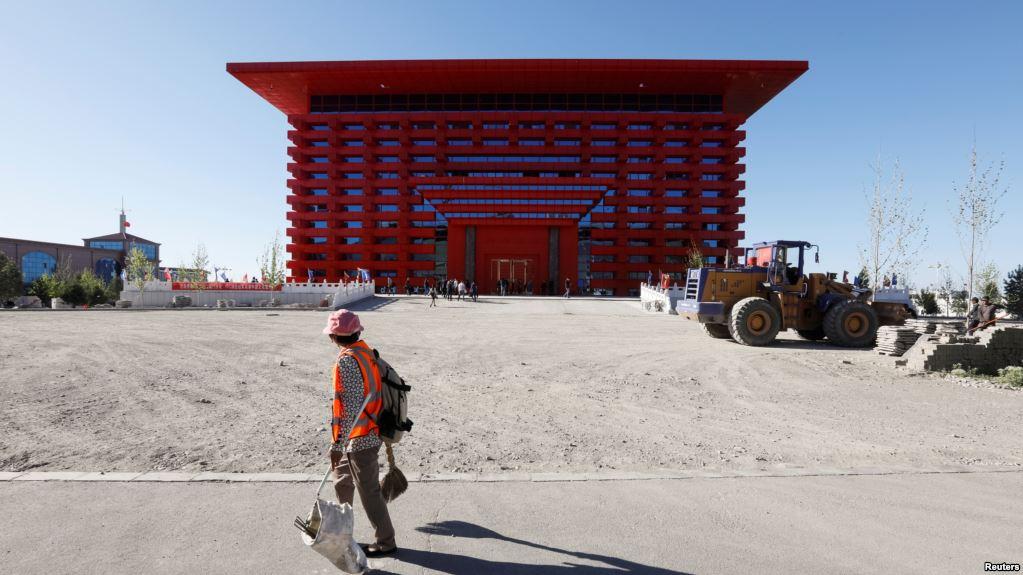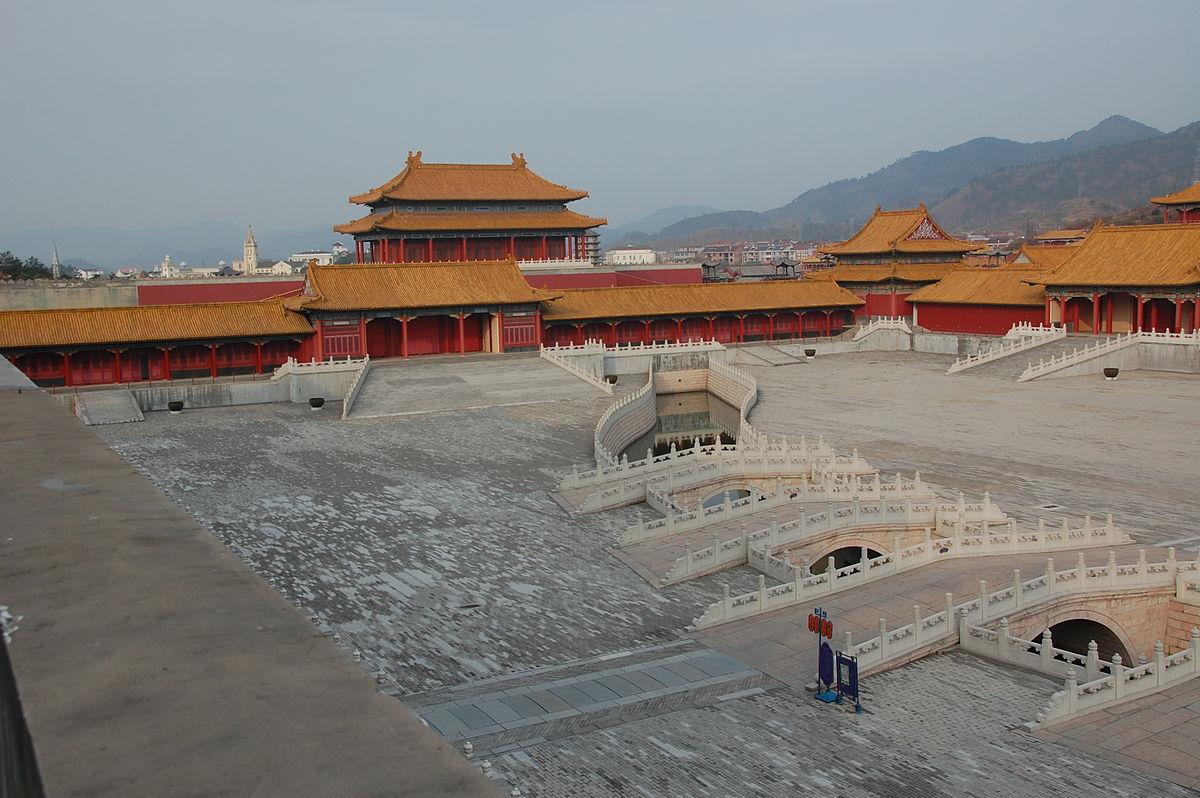Dead Chickens and Scared Monkeys: China’s Sprawling Celebrity Tax Scandal
archive


'House of Culture', part of the China-Kazakhstan Horgos International Border Cooperation Center in Horgos (Khorgas), China. (Photo credit: Reuters/Shamil Zhumatov)
Dead Chickens and Scared Monkeys: China’s Sprawling Celebrity Tax Scandal
China is on the verge of becoming the largest national film and television market, attracting more viewers and generating greater revenues than the United States, which has been the world leader for over a century. This seismic shift has occurred in the last decade, during a period of astronomical growth in mainland media that is a source of conspicuous national pride. Today, government officials and industry leaders have their eyes on global expansion, hoping to compete with Hollywood for economic and cultural influence worldwide.
Yet the industry found itself immersed in controversy in May 2018, as a scandal fit for soap opera burst onto the Chinese internet. Celebrated television anchor Cui Yongyuan posted images to his Weibo account which he purported were a pair of “yin-yang contracts” used by China’s most popular actress, Fan Bingbing, for a single acting job. The pair of documents, Cui accused, were used to hide the size of Fan’s true salary and thereby reduce her tax burden. Although public outcry immediately focused on Fan, Cui insisted the target of his ire was not the actress, but China’s most profitable director, Feng Xiaogang, with whom the anchor had carried on a public feud since the release of his film Cell Phone in 2004. In that film, a celebrated television anchor is caught in a love affair with a younger subordinate… played by Fan Bingbing. Cui has insisted for fifteen years that the story was pilfered from his own life and written to make him look bad.
What started as a public airing of a personal vendetta soon exploded into something much larger. Chinese state tax authorities stepped in, and Fan disappeared from public view for over 120 days only to finally reemerge with a public apology that included explicit thanks to the Communist Party and a pledge to pay a staggering $130 million USD (884 million CNY) in back taxes to the Chinese government.1 A Chinese adage espouses the strategy of killing a chicken to scare the monkeys—or to make a single grand display of harsh punishment to ensure the compliance of the masses. Although Fan’s fall from grace was an incredible public plunge, the crackdown that followed has impacted not only Chinese filmmakers, studios, and production facilities but also local-central government relations across the nation.
This short piece addresses how the Chinese media industry produced the conditions that led to the Fan scandal, how the scandal spread, and where things stand ten months on.
Rising film and television profits have sparked bidding wars over a limited supply of big name Chinese talent who are seen as reliably popular with audiences. To attract those actors in highest demand, studios have resorted to extralegal measures, including the double-contract system that bulks up star salaries with a second contract designed to exploit gaping tax loopholes. Although public outrage about the revelations ensued, few industry insiders seemed genuinely shocked by the details of the Fan case because the film business has been shielded from aggressive oversight during its meteoric rise over the past decade, a point of conspicuous national pride. What quickly became shocking were the governmental retributions that followed.

Fan Bingbing and Feng Xiaogang
The first company to feel the blowback was Huayi Brothers, China’s largest independent producer. Both Fan Bingbing and Feng Xiaogang have enjoyed long, close relationships with Huayi, and within days of Cui’s initial posts, the company’s value began to tumble. By September the stock had lost 38% of its value, and as a result of this free-fall, Huayi Bros. took out a $100 million USD loan from online retail giant and aspiring media content producer, Alibaba.2 This investment would keep Huayi Bros. afloat, but it also continued a trend of power consolidation occurring across China’s media industries.
Tax Havens
When the scandal first broke, actors’ contracts appeared to be the primary source of outrage, but as time passed, a wider extralegal system came into public view. For Fan’s contracts to effectively shield her from taxes, one of the two contracts was paid to a production company she had established in Wuxi, a city in Jiangsu province that has become one of China’s entertainment industry tax havens.
Thanks to the Wuxi exemption, Fan would be taxed at just a 3% rate for the larger of her two contracts. The normal tax rate for an actor’s salary is closer to 35%. As the scandal unfolded, the Propaganda Ministry (now in charge of all film industry oversight) united with the State Administration of Tax to target these tax havens.
Entertainment industry tax havens are familiar to many neoliberal economies around the world, but they are relatively new to China whose havens exhibit some extreme and peculiar contradictions. On the seemingly-logical end of the spectrum is the Hengdian tax haven. Located in Zhejiang province and home to one of the world’s largest film studio facilities, the tax break incentivizes companies to make use of local talent and resources. Wuxi has less of a direct connection to media production, but the city is only 100 miles from Shanghai and companies taking advantage of that haven often operate headquarters in the region.
To attract... actors in highest demand, studios have resorted to extralegal measures, including the double-contract system that bulks up star salaries with a second contract designed to exploit gaping tax loopholes.
Then there is Khorgas. Home to just 85,000 residents and nestled on the western border of China’s westernmost province, Xinjiang, Khorgas has no history of entertainment industry activity, and in fact, political sensitivities in the region prevent virtually any media production. Regardless, Khorgas was home to nearly 1,500 entertainment companies in 2018.3
Back in 2009, when Khorgas was home to zero media firms, the municipal government announced that they would exempt entertainment companies from taxes for the first five years of operation. To enjoy the tax break, companies were only required to process paperwork and send a single employee to the town. Media companies began flooding into Khorgas, including a company founded by Feng Xiaogang, another by actress/director Xu Jinglei, and several subsidiaries of Wanda Film.

'House of Culture' in Horgos (Khorgas), China. (Photo credit: Reuters)
Rewriting the Code
As the Fan Bingbing scandal exploded, the State Administration of Tax seized the opportunity to restore its control over local government tax schemes. On October 8, 2018, the Administration announced that provincial tax offices would begin re-examining returns for film and television production companies, talent agencies, and the companies of high-earning media personalities stretching back to 2016.4 In effect, the announcement not only eradicated tax havens, it retroactively declared the past three years of their operation to be illegal. A December 31 deadline was established for any unpaid taxes to be rectified, with heavy penalties for those who had failed to redress discrepancies by March 2019. This left local governments and entertainment companies on the hook for billions of dollars in back taxes.
When frustrated industry representatives met with tax authorities in November, they were told the haven systems were the result of “miscommunications” and that the new changes would help the industry move in a market-oriented and positive direction. At the time of that meeting, however, the industry view was overwhelmingly negative.
Between May and the November, there was little clarity about how deep and wide the crackdown would expand. In the face of this uncertainty and incalculable tax burdens, applications for government approvals of new media productions dropped almost 30%. In addition, completed and nearly-complete productions that included accused personalities like Fan and Feng were suddenly pulled from release.5

Hengdian World Studios, Zhejiang province, China.
Unsurprisingly, Hengdian studios took an especially big hit. By November, many of the biggest productions planned for Hengdian studios had been canceled, leaving only smaller productions that would pay less tax. Following the elimination of its haven status, it was estimated that Hengdian-based companies could see their tax bills increase by as much as tenfold.6
This reversal of fortune came on top of an already slowing media economy. After a remarkable string of years where box-office growth exceeded 25% annually, the past three years of growth hovered closer to 10% annually, undermining the government’s revenue targets for the industry and threatening to the health of once buoyant movie theater chains.
Accounts Settled?
According to China’s Tax Administration, as of February 2019, actors and film companies have paid $1.7 billion dollars in back taxes, an astounding amount equal to nearly 20% of the nation’s total 2018 theatrical box-office. In addition, a new tax system for the entertainment industry is scheduled to be unveiled in July 2019.
After a remarkable string of years where box-office growth exceeded 25% annually, the past three years of growth hovered closer to 10% annually, undermining the government’s revenue targets for the industry...
The past ten months have (again) laid bare the battle between economic and ideological goals within the modernizing Chinese media industries. Over the past decade, local governments, film companies, and actors have developed creative strategies to boost production by creating shelters away from strict tax oversight. This has helped lift production numbers and lower costs, but the exposure of the system has left the actors, companies, and governments looking insufficiently patriotic. To restore its authority and re-establish central oversight, the Chinese government has dealt serious financial blows to the nation’s film producers, who now face rising costs and growing competition for viewers, many of whom are now critical of top-line talent.
Moreover, this chain of events re-emphasizes the challenges that the government faces in trying to regulate a large number of small entertainment companies in a country the size of China. In the eyes of some government officials, fewer is better. Thus, Alibaba’s massive investment in Huayi Bros. echoes another trend sweeping across China’s media industries—the consolidation of power into the hands of a small set of massive media conglomerates.
Although few think the industry will struggle in the longterm, this crackdown on some of China’s biggest actors, directors, and production companies is a stinging reminder that ultimately everyone serves the Party, media celebrities included.
1. Chow, Vivienne. “China Cracks Down on Industry Taxes after Fan Bingbing Scandal,” Variety, October 8, 2018.
2. Brzeski, Patrick. “Chinese Studio Gets $100m Loan from Alibaba,” The Hollywood Reporter, January 23, 2019.
3. Cheng Siwei and Ke Dawei. “Credits Roll on Tax Loopholes for Movie Stars,” Caixin Global, July 30, 2018.
4. Charlotte Yang and Cheng Siwei. “Curtain Descends on Xinjiang Movie Tax Haven,” Caixin Global, October 9, 2018.
5. Chow, Vivienne. “China Release of Fan Bingbing-Bruce Willis film ‘Unbreakable Spirit’ is Scrapped,” Variety, October 2017, 2018.
6. Liu Shuangshuang and Jason Tan, “Tax Crackdown Sends Chill Through Movie Biz,” Caixin Global, November 13, 2018.
https://www.caixinglobal.com/2018-11-13/tax-crackdown-sends-chill-through-movie-biz-101346443.html



